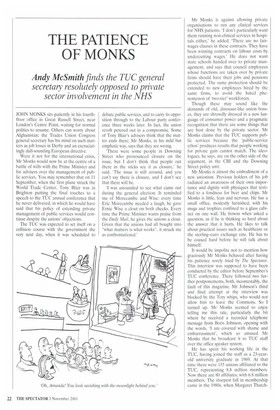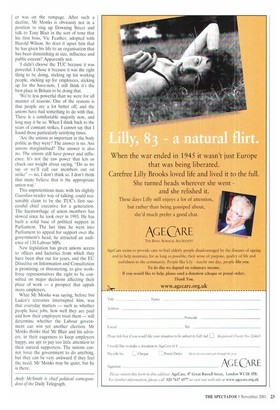THE PATIENCE OF MONKS
Andy MeSmith finds the TUC general
secretary resolutely opposed to private sector involvement in the NHS
JOHN MONKS sits patiently in his fourthfloor office in Great Russell Street, near London's Centre Point, waiting for normal politics to resume. Others can worry about Afghanistan; the Trades Union Congress general secretary has his mind on such matters as job losses in Derby and an excruciatingly dull-sounding European directive.
Were it not for the international crisis, Mr Monks would now be at the centre of a battle of wills with the Prime Minister and his advisers over the management of public services. You may remember that on 11 September, when the first plane struck the World Trade Center, Tony Blair was in Brighton putting the final touches to a speech to the TUC annual conference that he never delivered, in which he would have said that his policy of extending private management of public services would continue despite the unions' objections.
The TUC was expected to set itself on a collision course with the government the very next day, when it was scheduled to debate public services, and to carry its opposition through to the Labour party conference three weeks later. In fact, the union revolt petered out in a compromise. Some of Tony Blair's advisers think that the matter ends there; Mr Monks, in his mild but emphatic way, says that they are wrong.
'There were some people in Downing Street who pronounced closure on the issue, but I don't think that people out there in the sticks see it as closure,' he said. The issue is still around, and you can't say there is closure, and I don't see that there will be.
'I was astounded to see what came out during the general election. It reminded me of Morecambe and Wise: every time Eric Morecambe needed a laugh, he gave Ernie Wise a clout on both cheeks. Every time the Prime Minister wants praise from the Daily Mad, he gives the unions a clout. Given that the unions had all bought into "what matters is what works", it struck me as confrontational.'
Mr Monks is against allowing private organisations to run any clinical services for NHS patients. 'I don't particularly want them running non-clinical services in hospitals either,' he added. 'There are no fairwages clauses in these contracts. They have been winning contracts on labour costs by undercutting wages.' He does not want state schools handed over to private management, and says that council employees whose functions are taken over by private firms should have their jobs and pensions protected. The same protection should be extended to new employees hired by the same firms, to avoid the hated phenomenon of 'two-tier' workforces.
Though these may sound like the demands of old, dinosaur-like union bosses, they are shrewdly dressed in a new language of consumer power and a pragmatic recognition that there are some things that are best done by the private sector. Mr Monks claims that the TUC supports public services because the 'public-service ethos' produces results that people working for private gain cannot match. The ideologues, he says, are on the other side of the argument, in the CBI and the Downing Street policy unit.
Mr Monks is almost the embodiment of a new unionism. Previous holders of his job radiated an awareness of their own importance and dignity with physiques that testified to a fondness for beer and chips. Mr Monks is little, lean and nervous. He has a small office, modestly furnished, with his mugs and trophies confined to a glass cabinet on one wall. He frowns when asked a question, as if he is thinking so hard about the answer that it hurts. He likes to talk about practical issues such as healthcare or the sterling—euro exchange rate. He has to be coaxed hard before he will talk about himself.
It would be impolite not to mention how graciously Mr Monks behaved after having his patience sorely tried by The Spectator. This interview was supposed to have been conducted by the editor before September's TUC conference. There followed two further postponements, both, incontestably, the fault of this magazine. Mr Johnson's third and final attempt at the interview was blocked by the Tory whips, who would not allow him to leave the Commons. So I turned up. Mr Monks seemed to enjoy telling me this tale, particularly the bit where he received a recorded telephone message from Boris Johnson, opening with the words, 'I am covered with shame and embarrassment', which so amused Mr Monks that he broadcast it to TUC staff over the office speaker system.
He has spent his working life in the TUC, having joined the staff as a 23-yearold university graduate in 1969. At that time there were 155 unions affiliated to the TUC, representing 8.8 million members. Now there are 80 affiliates, with 6.8 million members. The sharpest fall in membership came in the 1980s, when Margaret Thatch er was on the rampage. After such a decline, Mr Monks is obviously not in a position to ring up Downing Street and talk to Tony Blair in the sort of tone that his first boss, Vic Feather, adopted with Harold Wilson. So does it upset him that he has given his life to an organisation that has been diminishing in size, influence and public esteem? Apparently not.
'I didn't choose the TUC because it was powerful. I chose it because it was the right thing to be doing, sticking up for working people, sticking up for employees, sticking up for the have-nots. I still think it's the best place in Britain to be doing that.
'We're less powerful than we were for all manner of reasons. One of the reasons is that people are a lot better off, and the unions have had something to do with that. There is a comfortable majority now, and long may it be so. When I think back to the years of constant strikes, I cannot say that I found those particularly satisfying times.
'Are the unions as important in the body politic as they were? The answer is no. Are unions marginalised? The answer is also no. The unions still have power and influence. It's not the raw power that lets us chuck our weight about saying, "Do as we say or we'll call our members out on strike— no, I don't think so. I don't think that many believe that is the appropriate union way.'
This unpretentious man, with his slightly Guardian-reader way of talking, could reasonably claim to be the TUC's first successful chief executive for a generation. The haemorrhage of union members has slowed since he took over in 1993. He has built a solid base of political support in Parliament. The last time he went into Parliament to appeal for support over the government's head, he attracted an audience of 130 Labour MPs.
New legislation has given unions access to offices and factories from which they have been shut out for years, and the EU Directive on Information and Consultation is promising, or threatening, to give workforce representatives the right to be consulted on major decisions affecting their place of work — a prospect that appals many employers.
What Mr Monks was saying, before bin Laden's terrorists interrupted him, was that everyday matters — such as whether people have jobs, how well they are paid and how their employers treat them — will determine whether the Labour government can win yet another election. Mr Monks thinks that Mr Blair and his advisers, in their eagerness to keep employers happy, are apt to pay too little attention to their natural supporters. The unions cannot force the government to do anything, but they can be very awkward if they feel the need. Mr Monks may be quiet, but he is there.
Andy McSmith is chief political correspondent of the Daily Telegraph.



















































































 Previous page
Previous page